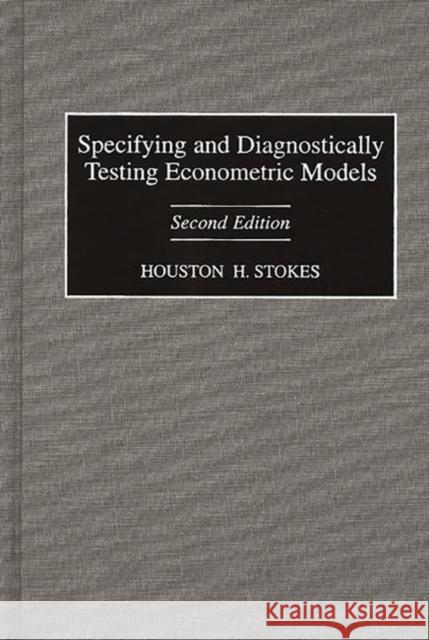Specifying and Diagnostically Testing Econometric Models » książka
Specifying and Diagnostically Testing Econometric Models
ISBN-13: 9781567200690 / Angielski / Twarda / 1997 / 464 str.
Stokes discusses--and illustrates with output from actual problems--a number of applied econometric techniques, including OLS specification tests, recursive residual analysis, limited dependent variable models, error component models, and others. His book is clearly written and copiously illustrated with equations, with follow-up analysis to show how models are built and some of their limitations. His B34S DEGREESDTM software is available and allows readers to do further research with a large number of datasets distributed with the program. A necessary resource for applied econometrics researchers in economics, finance, and in health, energy, and labor economics.
This work illustrates the use of model specification and diagnostic tests applied to a variety of econometric modeling techniques. For each technique discussed the basic mathematical models are outlined. A sample problem is discussed and estimated using the B34S DEGREESDTM Data Analysis System. The output of the program is displayed in the text and discussed. Where appropriate, output from the RATS DEGREESDTM software is displayed. Follow-up models are estimated and discussed. The examples selected are taken from a variety of sources and reflect actual applied research. Complete data are given in the text to enable the reader to use these problems with other programs and techniques. It is the author's experience that applied econometric techniques are best learned by running actual problems. Since most users experiment with a limited number of techniques, their experience is limited. This book discusses a broad range of techniques and shows how they are interrelated. DEGREESL DEGREESL The techniques discussed include the following: simple, one-equation OLS and GLS models with continuous variables on the left-hand side, which are tested with recursive residual and BLUS residual techniques. Another class of models includes restrictions on the left-hand side variables. Models studied and illustrated with data include probit, logit, multinomial logit, and ordered probit models. Other techniques discussed and illustrated include two-stage least squares, limited information maximum likelihood, three-stage least squares, iterative three-stage least squares, error component models and Markov probability models, which are illustrated with a model of OPEC production dynamics.
ARIMA and transfer function models are shown to be generalizations of the single-equation model, while VAR and VARMA models are shown to be a time series generalization of three-stage least squares and full information maximum likelihood models. VAR models are viewed in the frequency domain for added insight, and extensive nonlinearity tests are developed and applied. More specialized techniques include state space models, optimal control analysis, nonlinear analysis, and the QR approach to computation. An important feature of the book is the emphasis on nonlinear model building. The Hinich nonlinear testing approach is discussed and integrated into the OLS, times series, and nonlinear estimation procedures. The MARS and PISPLINE methods of analysis are illustrated with models that failed linearity tests when estimated with linear methods. The purpose of the monograph is to illustrate the above techniques, using actual research data. To facilitate the calculations, the B34S DEGREESDTM Data Analysis System was developed. Sample output for all procedures discussed in the text has been provided so that the availability of the B34S DEGREESDTM program is DEGREESInot DEGREESR required in order to benefit from this book. While the book is self-contained, interested readers can obtain the B34S DEGREESDTM Data Analysis program and do further research with the datasets discussed in the book which are supplied with the softwa











